SALT LAKE CITY — Without warning or time to prepare, millions of parents are now home-schooling their children for the first time, thanks to the novel coronavirus which has shut down schools across the country.
While the COVID-19 situation is unprecedented, there’s nothing inherently new about school at home. Thousands of families do it every day and tout the incredible benefits of being in control of their children’s educational journey.
The Deseret News talked with several home-school families across the U.S. and Canada who between them have more than 75 years of experience. Here’s their hard-earned wisdom on how to survive, and even enjoy, educating kids at home.
Expect to feel all the feels
It’s OK to be angry, frustrated, overwhelmed, excited and nervous — all at once and perhaps frequently.
“Expect tears — from the kids and from yourself,” says Lynnelle King, 47, of Eagle, Idaho, who fell into home schooling two decades ago when their family moved to Puerto Rico for a year.
Despite fully intending to reenroll her kids upon their return, she felt she should keep going — yet questioned that decision about every three months for the next two years.
Because parents didn’t choose this current situation, they may feel unprepared and overwhelmed, she says. Some may feel they’ve already blown it.
Take a deep breath. You won’t ruin your children.
Even these chaotic, stressful moments may be a source of humor later, says Stacey Lytle, from Kuna, Idaho, just outside Boise.
Her favorite home-school story is the day she had the “ridiculous idea” to make papier-mache planets with her brood of seven. She got things ready, then briefly left to check on her husband who was in bed recovering from an injury.
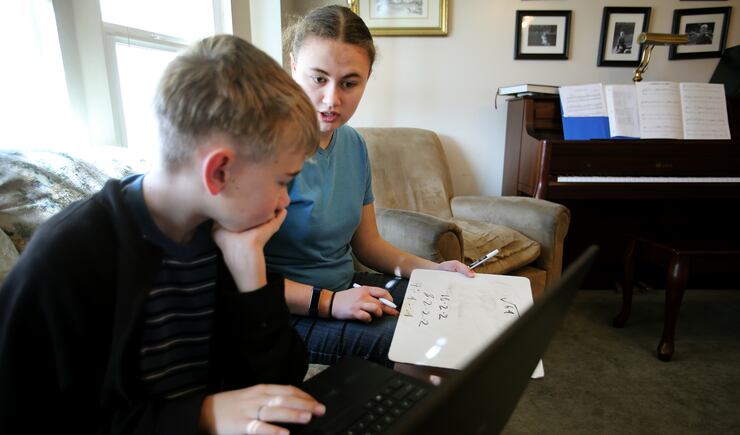
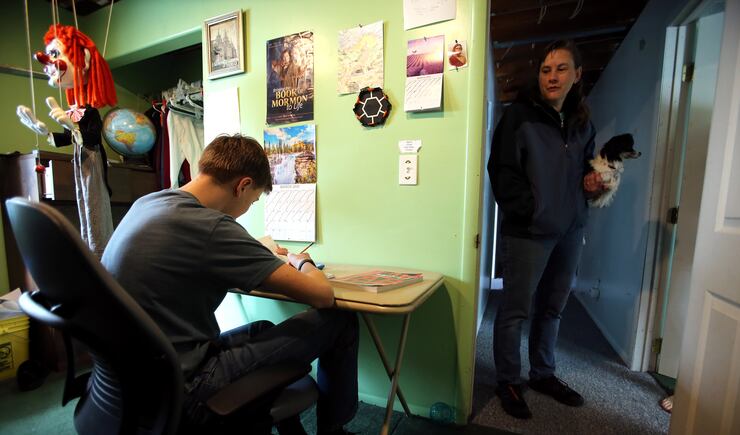
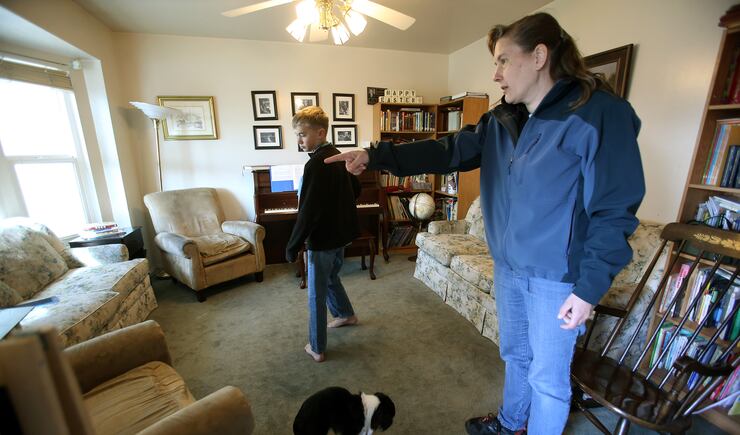
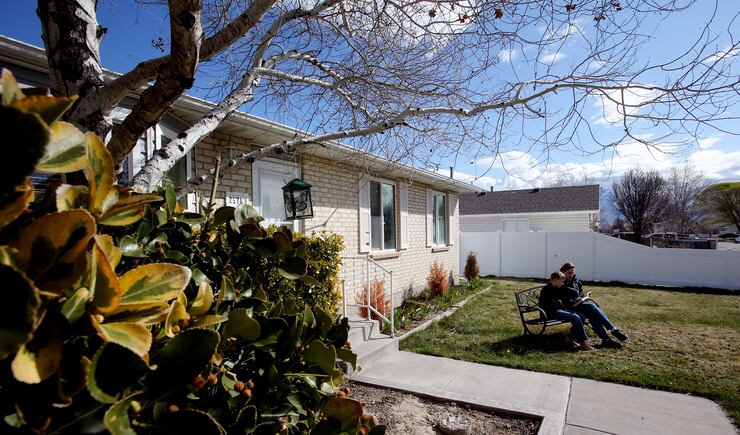
By the time she came back downstairs, papier-mache was everywhere — on every surface and every child. Just then, one of her boys decided to punch another brother in the stomach, causing him to throw up all over the carpet.
“I just wanted to create planets with my children,” she remembers thinking as she stood there in shock.
Accept that crazy moments will happen, but embrace them — they’ll make for great stories later.
Recognize you are enough
Sandy Grant, 47, didn’t plan to be a teacher. In fact, she was a veterinary technology major in college.
Yet that hasn’t stopped the Riverton, Utah, mom from home-schooling her six kids for the last 16 years. For her, home schooling is more like tutoring — not lecturing a group of 20+ kids.
“The only qualification that makes you a good home-schooler is your willingness to do it,” she says, “and loving your kids enough that you’re willing to do it.”
Don’t worry if you feel rusty in algebra or you don’t speak a second language. There are countless online resources — many even free or easier to access during this crisis — that can fill in any gaps.
And enjoy the chance to learn alongside your kids. When they see your sense of wonder when you finally grasp (or remember) that geometry concept, it will be way more contagious than an expertly delivered lesson, says Rebecca Spooner, 31, a second-generation home-schooler who teaches her five children in northern British Columbia and travels frequently to speak about home schooling.
“Let them see you search for answers and they will model you,” she encourages.
Own the experience
No matter how long this school-from-home experience lasts, families can make it fun by personalizing it.
King suggests naming your family school, creating a mascot and even choosing colors. Set three rules that will help your school run effectively.
Other families write down their vision, answering the question “What do we want to accomplish while the kids are at home?”
“This is new territory, your kids are unique, your home life is unique,” says Spooner. “Instead of looking to everyone else for answers, pay attention to the cadence and rhythm of your days and your kids and make this whole thing yours.”
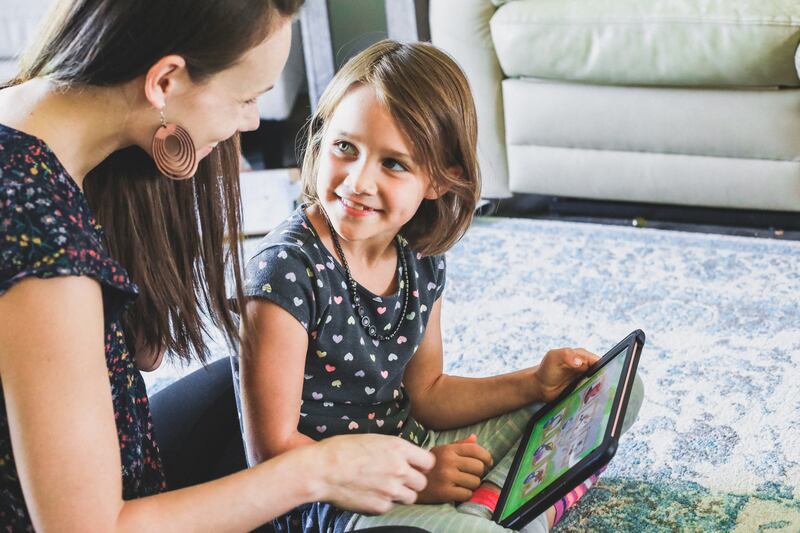
Once you’ve got a vision, a name and a plan, King encourages families to start each day with a devotional of sorts — whether it’s religiously focused, or something as simple as talking about the weather or an inspirational quote, before diving into the day’s responsibilities.
Find a rhythm
Some kids may like knowing that math happens at 8:30 a.m. sharp, while others may work better just knowing that after breakfast they read three short books, then do a few worksheets, followed by recess and lunch — without specific times attached.
If you’ve trying to manage schedules for several children at different stages, and maybe only one computer, try working on things where everyone can contribute — but on their own level. Spooner has written her own unit studies that accommodate many grades and ages.
Try reading a science book and ask kindergarten-level questions and fifth-grade questions. Working on math? Get out a Lego set and let the toddler count the blocks while the elementary-age kids do their multiplication worksheets.
If kids are old enough, have the older ones plan a lesson and teach the younger ones.
For parents who need to work from home, a daily calendar with color-coded times can signal to kids when you’re available to help and when they need to work independently, says Lytle, 52, who’s been home-schooling her seven kids for 25 years, while also running several businesses with her husband.
“If parents take a little bit of time to prep and plan,” Lytle says, “it’s very doable.”
At the end of each day, talk about the highs and lows and adjust as needed.
No matter your type of schedule, plan in daily brain and activity breaks, as well as things to look forward to each day and at the end of the week.
Be flexible
Katie Grimes Rotton pulled her son, Jake, out of first grade after she noticed him slipping from the progress they’d already made at home in Montgomery, Alabama.
As a single mom without much extended family support for home schooling, Rotton woke up early each day to prepare, then they’d do a few assignments together in the morning before Jake went to his grandma’s house and Rotton went to work.
He’d work on a few things there, and then they’d squeeze in more school in the afternoon when Rotton got home, plus time on weekends or holidays. They also joined a home school co-op which allowed Jake to learn from other parents and peers.
“We have never sat down for six to eight hours like they do in school,” she said. “Find what works best for you and your family.”
Now that Jake is older, their flexible schedule allows the 16-year-old time to go hunting or learn carpentry with his paternal grandfather, developing a bond that couldn’t have happened if he was in traditional school, says Rotton. Schoolwork still has to be done, but Rotton has stopped worrying about exactly when — nor does she compare their family to anyone else.
Parents also need to avoid the temptation to compare siblings to each other, says Grant.
Some kids like being timed to see how fast they can complete assignments, while others bristle at feeling rushed. Some kids are intensely self-motivated, while others may need consistent monitoring and ongoing encouragement. Remember to meet individual needs.
It’s about the relationship
Home schooling is more of a parenting issue than an education issue, says Lytle, who emphasizes that relationships comes first, then assignments.
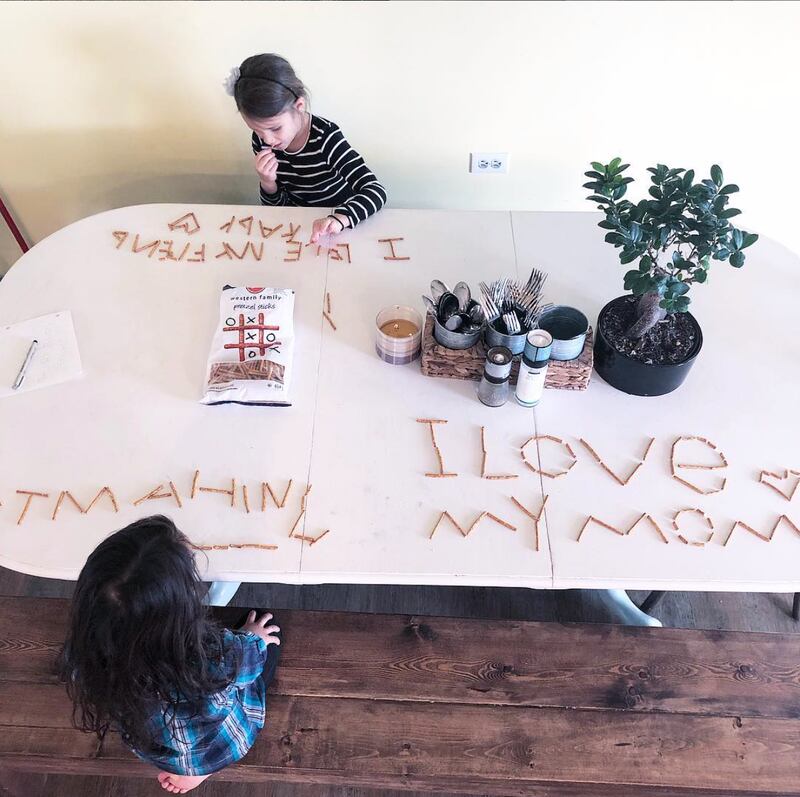
Especially now, when things are uncertain and kids may feel anxious, becoming a drill sergeant about homework and rigidly enforcing rules can make kids “despise their own education,” she says and may even strain family relationships.
So the next time you sit down to work desperately hoping your kids will focus on their assignments, but instead they interrupt you 12 times in 10 minutes, remember your response is more than important than their homework.
“When your kids go back to school, you want the relationships to have changed for the better,” King says.
And be intentional about relationship building. If parents put away their phones and spend just 10 to 30 minutes a day with each child doing something the child wants, King promises the family dynamic will improve.
Help your kids find their passions
During your parent/child time, ask your child what excites and delights them? What would they like to know more about?
Although this pandemic situation is stressful and difficult, it’s a unique opportunity where kids have large blocks of time to explore and learn, and parents can help spark a love of learning for learning’s sake — not just a grade.
Does your child love animals? Look up documentaries on lions or pandas, read books about penguins and then ask them to do a presentation to the family. If they’re younger, have them draw pictures and tell a story, while older kids can write a paper or design a PowerPoint presentation — all important educational skills.
Doing this means will allow parents to see “joy in their kids,” says Lytle. “They’re not going to be fighting with them. They’ll be self-motivated kids who want to grow, learn, research and explore the world.”






